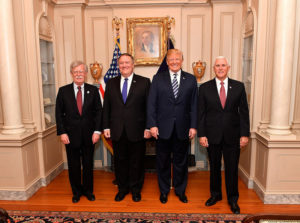
U.S. Secretary of State Mike Pompeo poses for a photo with (L to R) National Security Advisor of the United States John Bolton, President Donald J. Trump and Vice President Mike Pence before his swearing-in ceremony at the U.S. Department of State in Washington, D.C., on May 2, 2018. [State Department photo/ Public Domain]
I suspect that’s all right by John Bolton, who was frequently cited as having lost out in the decision to hold the meeting. But the crucial thing to keep in mind about Bolton is that he’s not just a manic war-hawk. On the issues he cares deeply about, he’s a savvy bureaucratic and political operator—maybe the only one in the White House right now.
In that light, if you think about the current political and policy context from Bolton’s point of view, it’s not bad at all.
Consider: Bolton did not convene a single Cabinet-level meeting to discuss the North Korea summit in the days preceding it. Why not? Simple: he’s more knowledgeable about North Korea than anyone else who would have been in the meeting, plus he’s closest to the president, geographically, and he knew that there was likely to be little of substance to emerge from an ill-prepared meeting. To be sure, he probably chafed at Trump’s decision to cancel joint US-South Korean military exercises, but in the scheme of things, that’s a loss you can take.
So is the outcome of the summit in Singapore, a platitudinous document jointly committing the United States and the Kim regime to the Great and the Good, with no substance detailing how. If I had to bet, I’d say Bolton’s thinking on North Korea is likely the same as his thinking on Iran, a subject I suspect he cares much more deeply about: Wait a while.
Describing the Johnson administration’s use of the Viet Cong attack on a U.S. installation at Pleiku in Vietnam as a tool for getting America into Vietnam, McGeorge Bundy remarked that “Pleikus are like streetcars.” That is, figure out what you want to do when you arrive and just wait for one to come by.
On North Korea, it seems very likely that Bolton doesn’t need to do anything. In the event the State Department began working on trying to flesh out details of North Korean “denuclearization,” Bolton knows very well that so much as defining that term is going to send the American side down a semantic rabbit hole from which they likely will not reemerge intact. If Bolton thought that there was a chance that negotiations could produce fruit–actual denuclearization in exchange for the withdrawal of American troops from the peninsula, for example–we would see or hear him fighting. The fact that we do not should suggest to us he has judged that fighting over the subject is not worth doing because the outcome is foreordained.
Meanwhile, some form of North Korean provocation is likely eventually, whether a move to restart nuclear tests, a pinprick attack against South Korea, a missile launch, or something else, and whatever it may be, it will serve to make Bolton’s argument for him: There’s no point in negotiating, because Pyongyang is intractably committed to confrontation.
On Iran, the picture is more interesting. Although Bolton convened no Cabinet-level meeting on North Korea, Politico notes that he has held Principals Committee meetings–which include Cabinet-level officials from the national security departments–on other subjects, and that these meetings have been “more focused” than the meetings convened by his predecessor. You can bet they were more focused–on Iran.
It is on that subject where Bolton has more work to do, and in particular more consensus-building to do inside the administration. While a very dark view of Iran is shared by all of the principals, Bolton has moved the ball by getting Trump to withdraw from the Iran deal. With the ball back in Iran’s court, Tehran unsurprisingly has announced that it intends to increase its enrichment capacity, putting us closer to the 2014-2015 hysteria that prevailed in Washington. With the United States having reneged on the deal, and with Iran acting accordingly, it’s likely that all Bolton has to do is wait. If Iran continues violating the spirit, to say nothing of the letter of the deal, Bolton will say we need to confront them.
And Trump is likely to follow.





